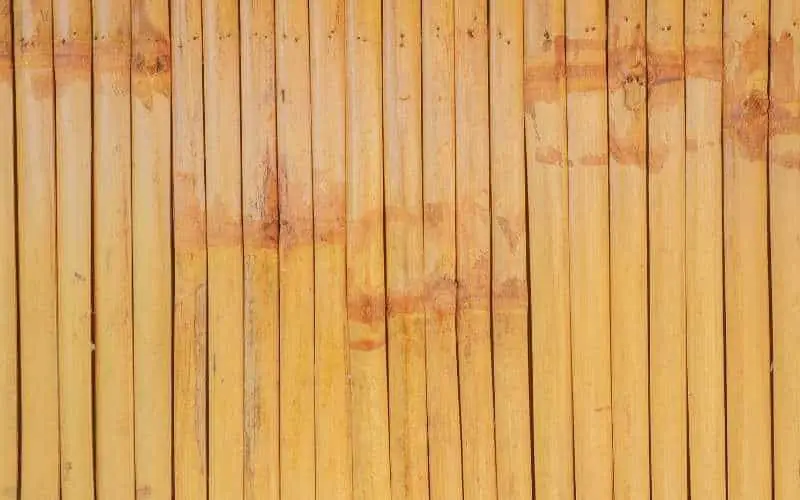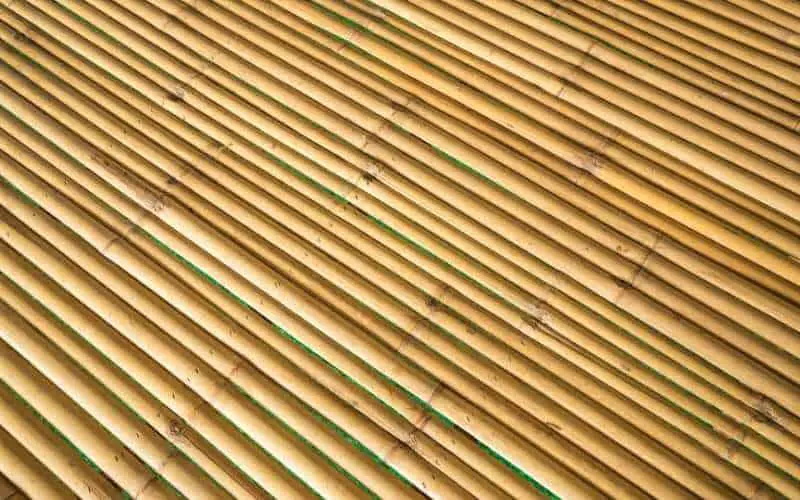Is bamboo flooring waterproof? No! Bamboo may be more resilient than hardwood, but that doesn’t mean they are waterproof.
Bamboo is grass, so it is a bit more water-resistant than most flooring types but is not completely immune to damage.
Spillages should be wiped up immediately they occur, and do not expose bamboo flooring to too much moisture for a long period of time as that can cause water damage.
Water damage may lead to swelling, warping, distortion and even discolouration of your flooring.
Related: Cork vs Bamboo Flooring Which is better?
What Happens if Bamboo Flooring Gets Wet?
Table of Contents
Bamboo floors are more water-resistant and resilient than hardwood floors and can survive better in areas where humidity and temperature fluctuate than most flooring.
But what happens if bamboo flooring gets wet? Bamboo is not completely impervious to moisture, and exposing it to areas with excessive moisture and water can cause serious water damage. Bamboo flooring is not suitable for moisture-prone areas like the bathroom or kitchen.
Prevent excessive spillage of water or liquids on your bamboo floor and clean away any spills immediately they occur using a soft, absorbent cloth.
Pros and Cons of Bamboo Flooring
Advantages of Bamboo Flooring
Environmentally Friendly
Bamboo is considered grass, with a five to seven-year growth cycle; this is unlike traditional hardwood that is made from oaks, rock maple and hickory trees, which can take around 20 years to mature before it is harvested.
Easy Maintenance
Keeping bamboo floors in good shape only requires regular light sweeping and vacuuming to keep dust and debris off the floor surface. Occasional wet cleaning with a mild soap and water solution can help keep your floor shiny and looking cleaner.
Durability
Bamboo flooring can hold its own against wear and tear, so it is excellent for high traffic areas like living rooms, kitchens, and entryways. It has high resistance to abrasion caused by footwork and the impact of fallen objects.
The most resilient type of bamboo flooring is strand woven bamboo-this are made from woven grass fibers, which creates an interlocking pattern that can be three times stronger than other types of bamboo flooring.
Read: Cleaning Bamboo Floors With Vinegar
DIY-Friendly
Most types of bamboo flooring are easy to install and can be undertaken by DIYers looking to cut down installation costs. There are floating bamboo planks that use a “click-lock” system; these are super easier to install and require little or no professional knowledge on floor installation.
Floating bamboo planks are not only easier to install, but because they are not in direct contact with the subfloor, there is expansion space that allows the floor to expand and contract as humidity levels change in the room.
What Are The Problems With Bamboo Flooring?
Prone to Scratches
Bamboo may be highly durable but are quite predisposed to scratches, just like most wood floors. You can keep this in check by placing felt pads underneath furniture and refinishing your bamboo floor as often as needed.
This will help to prolong the lifespan of your flooring and reduce the appearance of scratches.
Not So Many Varieties
Bamboo flooring lacks an array of choices when it comes to picking a style. They are best suited for homes with contemporary and Scandinavian design styles.
Although if you’ve got a creative eye, you may adapt your bamboo flooring to suit any style of choice. But generally, bamboo floorings are only available in vertical and horizontal grains, with a limited range of finishes and tones.
Cannot Withstand Moisture
Bamboo is erroneously dubbed waterproof; this is, however, not true. Bamboo flooring is made from grass and is greatly affected by humidity even more severely than hardwood flooring.
So keep off this flooring from extremely humid regions or areas that experience drastic climate changes. The buildup of moisture in bamboo flooring can cause the floor planks to swell and buckle.
Bamboo flooring should also be kept off environment with extremely low humidity, as it can cause the planks to shrink significantly, making them more likely to crack. Using a humidity monitor will help you to keep an eye on the air moisture levels and maintain it when seasonal temperatures shift.
How Do I Protect My Bamboo Flooring
Here are a few tips to protect your bamboo flooring from damage and keep it in a good shape
- Wipe up spills immediately they occur and do not allow water to sit on the floor surface for too long, so it doesn’t get absorbed into the flooring.
- Place doormats at the entryway of the room to trap moisture, dirt and grit that can get tracked in by shoes or boots onto the floor.
- All footwear should be removed and left at the entrance or home’s porch.
- Also, place anti-scratch felt pads on the bottom of furniture to prevent it from denting and scratching your bamboo floor.
- Avoid dragging heavy furniture or objects with sharp ends like toys or stiletto-heeled shoes across your floor as they ultimately damage your floor.
Read: 5 Best Mop for Bamboo Floors
Conclusion
Is bamboo flooring waterproof? Of course, they are not. Bamboo is a grass that is typically made from weaving grass fibers together. Notwithstanding, bamboo flooring is more resilient compared to other floorings like hardwood.
You might also want to know what happens if bamboo flooring gets wet? So you can prepare accordingly for the rainy days. This highly durable flooring should be kept off moisture at all costs; bamboo flooring is made from grass, so it will easily succumb to damage caused by excessive moisture.

